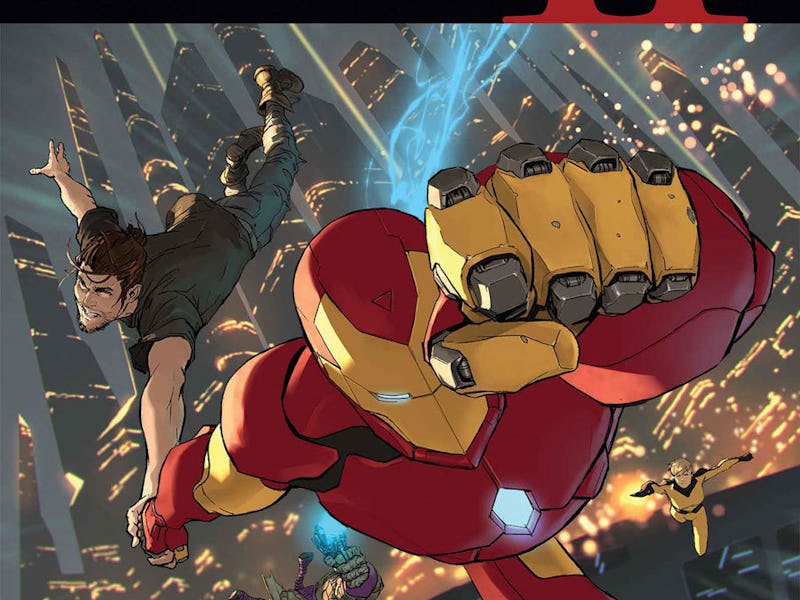Marvel's 'Civil War II' Issue #2 Offers A Great Reason Not to Root for Iron Man
A popular superhero turns into a real bad guy in the second issue of Marvel's 'Civil War' sequel.

Superheroes aren’t saints. At their core, they’re unlawful vigilantes who have no more authority than you or me. They simply have the means to do things we can’t, and without those they’re just as selfish and irrational like us. This was the point of Alan Moore’s seminal Watchmen, and the best comics today continue to reflect that point, not its gritty violence. Marvel’s Civil War II is by no means the next Watchmen, but issue #2 of the ongoing cross-over shows Marvel isn’t afraid to let its shiny movie franchises get in the way of dirtying up its biggest players. In Issue #2 of Civil War II, Iron Man gets mud on his suit in pretty disgusting ways.
After the death of Rhodey in issue #1, Tony Stark flies to New Atillan, home of the Inhumans, and straight up kidnaps Ulysses, the Inhuman at the center of the new conflict. Ulysses can see the future, but he didn’t see his abduction by a vengeful tech billionaire. Stark is understandably pissed: He’s lost a friend, a brother-in-arms, and even in a medium where death is just a bump in the road, Rhodey’s demise weighs heavy on Iron Man.
But Stark’s actions are reprehensible anyway you slice it. Ulysses is a kid (in college, but still a kid), and abduction and torture are pretty Gestapo things an unlawful vigilante can do, no matter how harmless his “torture” was. Yeah, the extent Stark lays his hands on Ulysses is flicking his head — I’ve been more hurt doing keg stands — but as a superhero who wants to inspire and represent the world of tomorrow, Stark is barbaric in Civil War II.
And yet, it all actually echoes Iron Man in Mark Millar’s original Civil War. Stark’s lead on the pro-registration kerfuffle speaks to his hidden totalitarian side, hiding way underneath in his libertarian ego. Marvel Studios went to great pains to show why a guy who “privatized world peace” would fight for an overreaching multinational rule like the Sokovia Accords, which Marvel Comics didn’t really do. A guy who would be pro-registration would kidnap a dangerous Inhuman in the middle of the night, for “science.”
Because of Stark, the Inhumans are ready to declare war, but not before Carol Danvers, a.k.a. Captain Marvel, can intervene. And that’s when Ulysses’s powers goes haywire, foreseeing a rabid Hulk (Bruce Banner, not Amadeus Cho) holding both Stark and Danvers dead (?) in his big green hands. It’s a new wrinkle for the plot and the savage splash page is gorgeously drawn despite its violence (Hawkeye is legit impaled through the chest).
Issue #2 of Marvel's 'Civil War II'
Civil War II seemed like a dubious premise and, pessimistically, a cash-in for Captain America: Civil War, which grossed a bajillion dollars and would maybe win Best Kick-Ass Picture at the Academy Awards if such a thing existed. And while the book’s sci-fi story is removed from the grounded, timely feeling the first book was, issue #2 cements Civil War II as more than just superheroes fighting superheroes. This time, it’s actually good guys versus bad guys.